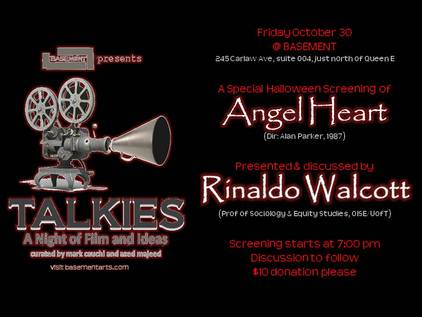In the moment of the popularity of television shows like True Blood, returning to films like ANGEL HEART (1987) offers us the opportunity to address a range of representative practices within popular culture that breach the divide between religion, sex, blood and human beings organic relation to the a larger life world beyond our comprehension. Angel Heart draws on the traces of black diasporic spiritual cultures to trouble what it is we think we might know about life, death and indeed the thing that makes it all possible: blood. Conceived and unleashed in the midst of one of the planet’s most contentious upheavals about blood: HIV/AIDS, Angel Heart spills beyond the screen into the everyday social spaces of our lives. I propose to discuss a range of social implications of the cinematic text not all tied to it but implied by it.
RINALDO WALCOTT is Associate Professor and Chair of the Department of Sociology and Equity Studies in Education at OISE. His research and teaching is in the area of Black Diaspora Cultural Studies with an emphasis on queer sexualities, masculinity and cultural politics. A secondary research area is multicultural and transnational debates with an emphasis on nation, citizenship and coloniality. As an interdisciplinary scholar Rinaldo has published on music, literature, film and theater among other topics. All of Rinaldo’s research is founded in a philosophical orientation that is concerned with the ways in which coloniality shapes human relations across social and cultural time. Rinaldo is the author of Black Like Who: Writing Black Canada (Insonmiac Press, 1997 with a second revised edition in 2003); he is also the editor of Rude: Contemporary Black Canadian Cultural Criticism (Insomniac, 2000); and the Co-editor with Roy Moodley of Counselling Across and Beyond Cultures: Exploring the Work of Clemment Vontress in Clinical Practice (University of Toronto Press, 2010).
RINALDO WALCOTT is Associate Professor and Chair of the Department of Sociology and Equity Studies in Education at OISE. His research and teaching is in the area of Black Diaspora Cultural Studies with an emphasis on queer sexualities, masculinity and cultural politics. A secondary research area is multicultural and transnational debates with an emphasis on nation, citizenship and coloniality. As an interdisciplinary scholar Rinaldo has published on music, literature, film and theater among other topics. All of Rinaldo’s research is founded in a philosophical orientation that is concerned with the ways in which coloniality shapes human relations across social and cultural time. Rinaldo is the author of Black Like Who: Writing Black Canada (Insonmiac Press, 1997 with a second revised edition in 2003); he is also the editor of Rude: Contemporary Black Canadian Cultural Criticism (Insomniac, 2000); and the Co-editor with Roy Moodley of Counselling Across and Beyond Cultures: Exploring the Work of Clemment Vontress in Clinical Practice (University of Toronto Press, 2010).

